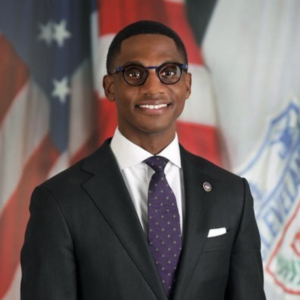Climate Mayors closes out the year by welcoming a new leadership team and looking ahead to key 2024 climate action priorities
December 12, 2023 – Today, Climate Mayors looked to the future as it ushered in its new leadership team and honed in on new pathways to supercharge climate action in 2024. With Mayor Satya Rhodes-Conway of Madison concluding her term as Chair of the organization, Mayor Justin Bibb of Cleveland, Ohio will take over as Chair for the 2024 year. Having served as Vice-Chair in 2023, he will continue to build his climate legacy as a strong advocate for elevating local climate leadership. Mayor Kate Gallego of Phoenix, Arizona, who has held her Vice-Chair position since 2021, and new incoming Vice-Chair, Mayor Lauren McLean of Boise, Idaho will round out the Climate Mayors leadership team.
Over the past year, cities have begun to feel the transformative impacts of federal investments like the Inflation Reduction Act and Bipartisan Infrastructure Law. 2024 will be another crucial year to further accelerate climate action, with no time left to waste in implementing ambitious plans to reduce emissions and build more climate-resilient communities across the country. These admirable leaders have served as models for city-led solutions to the climate crisis, and are positioned to continue their leadership with an acute focus on issues such as environmental justice, building and fleet electrification, and public health and safety over the next year.

The first millennial Mayor of Cleveland, Ohio, Mayor Justin Bibb has served as mayor since 2022. As Vice-Chair of Climate Mayors for the past year, Mayor Bibb has worked tirelessly to advance key policy initiatives that support cities and elevate local voices at the federal level. Mayor Bibb has emphasized the crucial role of local leadership in leveraging historical federal funding from the Inflation Reduction Act (IRA) and Bipartisan Infrastructure Law (BIL) and taking meaningful and equitable climate action in cities like Cleveland, which continue to experience climate vulnerability as a result of historic disinvestment.
As an elected leader devoted to advancing racial, social, and health equity in his hometown, Bibb has highlighted the importance of public-private collaboration and maintained strong ties to community-based organizations focused on achieving the change that Cleveland communities want and need to see in their city.
With climate justice at the heart of his platform, Mayor Bibb works to represent and uplift the concerns of community members who have experienced adverse effects to health and wellbeing as a result of climate change. To ensure this remains of priority, he appointed Cleveland’s first Director of Sustainability and Climate Justice during his first year as mayor. Mayor Bibb has continued to prioritize environmental justice by advancing affordable solar energy for low and moderate-income families in the city, championing the 15-minute city framework as an economic and climate justice policy that connects communities while decreasing transportation emissions and air pollutants, and mobilizing historic federal funding to take multi-level action in order to rapidly decarbonize the Greater Cleveland region. Mayor Bibb also passed an improved Complete and Green Streets Ordinance, which calls for a restructuring of Cleveland’s roads to prioritize people over cars, and is working to reduce flooding and boost communities’ access to water and green spaces through new climate resilience proposals.
As Chair of Climate Mayors, Mayor Bibb has highlighted three priorities for his one-year term:
- Increase the recognition of Climate Mayors at the national and international levels and showcasing city success stories
- Build up funding infrastructure for the organization
- Emphasize and empower regional engagement with peer mayors
- Ensure federal funding benefits communities of color and those most vulnerable to climate change
“I am honored to step into the role of Climate Mayors Chair and to continue to champion ambitious climate action for more just and sustainable cities,” said Mayor Bibb. “With this platform, I will work together with fellow Climate Mayors, the federal government, public and private institutions, and community-based organizations to leverage historic federal funding in a way that benefits communities across the country – particularly those that are most vulnerable to climate impacts due to historic injustices.”

Mayor Kate Gallego of Phoenix, Arizona has held office since 2019, serving as Vice-Chair of Climate Mayors since 2020 and Vice-Chair of C40 Cities since 2021. Continuing her role as Vice-Chair of Climate Mayors in 2024, Mayor Gallego emphasizes that climate action must be prioritized in local, state, and federal elections and that Climate Mayors must have a strong voice in advocating for a sustained commitment to the promises made in the Inflation Reduction Act (IRA) and the Bipartisan Infrastructure Law (BIL).
On the local level, Mayor Gallego aims to make Phoenix the most sustainable desert city on the planet – and that means tackling the dual challenge of heat and water. Phoenix was the first city in the country to take the American Forests’ Tree Equity Pledge in 2021, a commitment that all neighborhoods achieve a standard of shade cover by 2030. Under Gallego’s leadership, Phoenix established the first publicly funded Office of Heat Response and Mitigation in the nation to drive innovative strategies for a cooler, more comfortable city.
Additionally, new water conservation policies and regional working groups aim to build common ground among Western mayors and local officials to uplift conservation successes that demonstrate a shared commitment to reducing dependence on the strained Colorado River. Phoenix is instituting conservation measures at all scales – from Sustainable Desert Development policies that significantly reduce water use in new construction, to incentivizing residents to adopt native desert vegetation and efficient appliances.
Going into her 3rd year as Vice-Chair of Climate Mayors, Mayor Gallego has identified three key priorities for 2024:
- Sustain commitments of Inflation Reduction Act and Bipartisan Infrastructure Law and highlighting local implementation success stories
- Continue to uplift and support the efforts of the Western Water Security regional working group
- Expand meaningful engagement opportunities for Climate Mayors members
“Cities have long led on the forefront of climate change solutions – and with more federal funding flowing than ever, we’re taking our commitments to new heights,” said Mayor Gallego. “I am excited to continue my role as Vice-Chair of Climate Mayors to serve Phoenix and the nation at large, especially at such a pivotal time. Together with Mayors Bibb and McLean, I am committed to leveraging the Climate Mayors network to advance people-first climate initiatives that meet the unique needs of our communities.”

In 2019, Lauren McLean became the first woman to be elected Mayor of Boise. In her time as mayor, she has proved her steadfast commitment to advancing localized climate solutions – believing strongly that mayors, local governments, and tribes know best what residents and communities need to be prepared for climate impacts now and in the future.
Mayor McLean has seen the worsening climate impacts first hand in Boise. Last summer, the city experienced its second hottest summer, with nearly twice as many days over 100 degrees than 30 years ago. But under McLean’s leadership, the city has fought climate change ambitiously — especially through the city’s goal to be powered by 100% clean electricity for its government operations by 2030, which Boise is on track to meet five to six years early.
In 2021, Mayor McLean joined The America the Beautiful initiative, a coalition of 70 mayors committed to conserving 30 percent of American lands by 2030. McLean has worked to build out Boise’s program to protect 30 percent of open space and parks – specifically with the plan to double the city’s tree canopy. And looking to future generations, mayor McLean launched the Youth Climate Action Council, which unites young people from across Boise to take action on climate issues with creative projects.
As incoming Vice-Chair, Mayor McLean highlighted 2 key priorities for the 2024 year:
- Ensure that crucial funds for climate action flow directly to cities, particularly for those in traditionally red states.
- Cultivate new ways for Climate Mayors to connect and leverage expertise between member cities, and continue empowering cities to advance climate priorities.
“Climate Mayors is providing crucial guidance to city leaders across the country to access funds and pool resources and knowledge to advance meaningful climate solutions,” said Mayor McLean. “The role of local governments in creating a climate ready future for our kids and theirs cannot be understated, as we hear from our residents every day how important this work is to them. I am thrilled to join Mayors Bibb and Gallego on the leadership team and to continue this essential work for Boise and beyond.”
###
For media inquiries please contact climatemayors@fgsglobal.com




